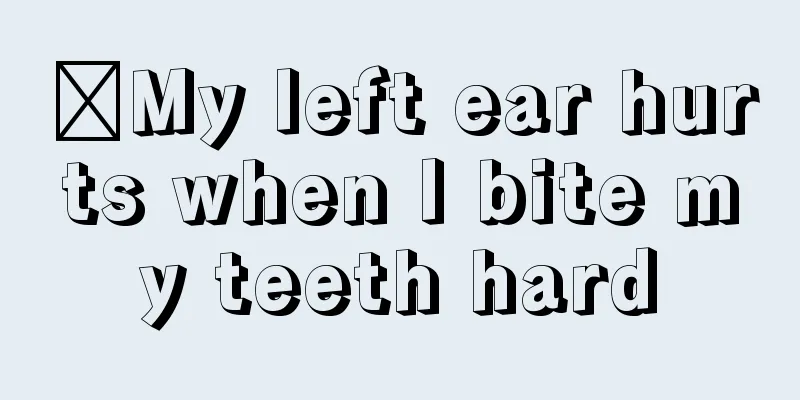My left ear hurts when I bite my teeth hard

|
Many friends think that the pain in the left ear caused by biting the teeth hard is caused by dental disease. However, there is a more likely reason, which is otitis media. Therefore, I would like to introduce to you the symptoms of otitis media. Friends who feel pain in the left ear when biting their teeth hard can refer to the following content to compare whether their symptoms basically meet the requirements and take appropriate treatment methods. Symptoms of otitis media 1. Hearing loss: decreased hearing and enhanced self-hearing. When the head tilts forward or toward the healthy side, hearing may temporarily improve (positional hearing improvement) because the effusion leaves the cochlear conduction. When the effusion is viscous, hearing may not change with changes in head position. Children are often brought to the doctor by their parents because of their slow response to sounds, poor concentration, and poor academic performance. If one ear is diseased and the hearing in the other ear is normal, it may not be noticed for a long time and may only be discovered during a physical examination. 2. Earache: Acute cases may cause dull earache, which is often the first symptom of the patient. It may be continuous or cramping. In chronic cases, ear pain is not obvious. This disease is often accompanied by a feeling of blockage or stuffiness in the ear, which can be temporarily relieved by pressing the tragus. 3. Tinnitus: It is mostly low-pitched and intermittent, such as "crackling", buzzing and the sound of running water. When the head moves or when yawning or blowing the nose, a sound of air passing through the ears may be heard, sometimes intermittently and then reappearing. 4. The skin around the patient feels "numb" and the patient feels psychologically depressed. 5. Serious complications of acute otitis media include infection of adjacent bones (mastoiditis or petrous bone osteitis), semicircular canal infection (labyrinthitis), facial paralysis, hearing loss, meningitis, brain abscess, etc. Signs of serious complications include headache, severe deafness, dizziness, chills, high fever, etc. In the early stages, there are only ear pain, hearing loss, tinnitus, and ear stuffiness. Acute otitis media develops rapidly, and its early symptoms are mainly similar to those of chronic otitis media. The simple type is the most common, characterized by intermittent ear discharge of varying amounts. The pus is mucous or mucopurulent and generally does not smell. In the early stage of the bone ulcer type, there is often acute necrotizing otitis media, persistent pus discharge from the ear, blood in the pus, and often a foul odor. The cholesteatoma type is characterized by long-term pus discharge from the ear, with varying amounts of pus, blood streaks in the pus, and a peculiar foul odor. |
<<: Quick relief for earache and insomnia
>>: Can I drink honey if it smells like sprinkles?
Recommend
What is the cause of stiff back
A stiff back will have a certain impact on our li...
Will eating too much Sophora japonica flowers cause poisoning?
Sophora japonica is a beautiful flower that is qu...
Sequelae of brain trauma, these must be prevented
Brain trauma seems to be a very normal disease, b...
Experts analyze common treatment methods for advanced cervical cancer
When it comes to advanced cervical cancer, many f...
How to use a red wine opener
Red wine is a type of wine that is frequently con...
What tests should be done when liver cancer is suspected? The most commonly used test for early liver cancer is this
Liver cancer is a very serious malignant disease....
What does tuberculosis mean
Tuberculosis is also known as pulmonary tuberculo...
Diffuse echogenic changes in the thyroid gland
What should I do if diffuse echo changes of the t...
How to supplement shortness of breath with food?
The most basic characteristic of human life is me...
What to do if herpes grows on your lips? Three tips to solve it for you
Many people may know about herpes, which is a ter...
How long can you live after laryngeal cancer treatment
Laryngeal cancer is a malignant tumor that occurs...
What are the new chemotherapy drugs for ovarian cancer
In the clinical trial, all subjects had taken ant...
Overview of thyroid cancer
Nowadays, thyroid cancer is known to more and mor...
What causes pointed feet
Pointed feet can be divided into two types, physi...
Is moxibustion effective in treating athlete's foot? Is moxibustion effective in treating athlete's foot?
Many people have athlete's foot. If you have ...









